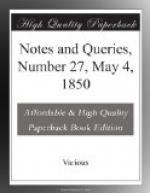EDWARD F. RIMBAULT.
* * * * *
“ESQUIRE” AND “GENTLEMAN.”
The custom of addressing almost every man above the rank of an artizan or a huckster as “Esquire,” seems now to be settled as a matter of ordinary politeness and courtesy; whilst the degradation of the gentleman into the “Gent,” has caused this term, as the title of a social class, to have fallen into total disuse. Originally, they were terms that had their respective meanings as much as Duke, Knight, Yeoman, or Hind; but now they simply mean courtesy or contempt towards {438} the person to whom they are applied,—with the exception, indeed, of certain combinations of circumstances under which the word “Gentleman” is applied as a character.
It would be an interesting occupation to trace the mutations of meaning which these words have undergone, and the circumstances which gave rise to the successive applications of them. The subject has been often touched upon more or less slightly; but I know of no work in which it is discussed fully, though, indeed, there may be such. Of course, many of your readers are men whose pursuits have lain in other directions than social customs, social language, and social tastes; and, as one of them, I may be permitted to ask either where a full discussion can be found, or that some of your correspondents will furnish through your medium a clear and tolerably full exposition of the question. I believe it would be of general and public interest.
We naturally expect, that in official correspondence, the public boards, through their proper officers, would be very precise in assigning to every person his proper title, in the address of a letter. Yet nothing can be more negligent and capricious than the way in which this is done. I have held an appointment in the public service, which is generally considered to carry with it the title of “Esquire,” (but really whether it do or not, I am unable to tell), and have at different times had a good deal of official correspondence, sometimes mere routine, and sometimes involving topics of a critical character. From my own experience I am led to think that no definite rule exists, and that the temper of the moment will dictate the style of address. For instance, in matter-of-course business, or in any correspondence that was agreeable to official persons, I was addressed as “Esq.;” but if the correspondence took a turn that was unpleasant, it was “Mr. ——;” and on one occasion I received a note addressed with my name denuded of all title whatever, even of the office I filled. The note, I hardly need say, was “full of fire and fury;” and yet, in less than half an hour, I received a second (the writer having discovered his mistake), opening with “My dear Sir,” and superscribed with the “Esquire” at full length. This, I think, proves the capriciousness of men in public stations in their assignment of titles of this kind.




